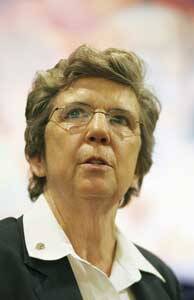As events moved rapidly toward a conclusion of the yearlong and often discordant national debate over health care reform, ruptures appeared in what had been a unified front among national Catholic leaders. In a statement on March 13, the head of the Catholic Health Association called on House members to pass quickly the Senate-approved health care reform bill, even as the U.S. Conference of Catholic Bishops reiterated its position that the Senate language on abortion was unacceptable. A House vote on the health reform legislation was expected by March 20, with Senate and House action by a reconciliation vote to follow on a separate bill containing a set of legislative “fixes.”
In the statement, Carol Keehan, a member of the Daughters of Charity who is president and chief operating officer of the C.H.A., argued that the Senate bill may not be perfect but would still “make the lives of millions more secure, and their coverage more affordable.” Sister Keehan said she considered the Senate language “an acceptable way to prevent federal funding of abortion.”
In an even more sharply worded divergence from the bishops, the heads of 60 U.S. orders representing 59,000 Catholic sisters signed a letter on March 17 urging passage of the Senate reform package. The sisters called the Senate measures “imperfect” but said: “Despite false claims to the contrary, the Senate bill will not provide taxpayer funding for elective abortions. It will uphold longstanding conscience protections and it will make historic new investments—$250 million—in support of pregnant women. This is the real pro-life stance, and we as Catholics are all for it.”
Just two days earlier the U.S.C.C.B. president, Cardinal Francis George, O.M.I., in a letter to Congress had personally described in detail the bishops’ unhappiness with the Senate language about abortion: “Notwith-standing the denials and explanations of its supporters, and unlike the bill approved by the House of Representatives in November,” Cardinal George said, “the Senate bill deliberately excludes the language of the Hyde Amendment. It expands federal funding and the role of the federal government in the provision of abortion procedures. It forces all of us to become involved in an act that profoundly violates the conscience of many, the deliberate destruction of unwanted members of the human family still waiting to be born.”
An analysis by Timothy Stolfzfus Jost of the Washington and Lee University School of Law argued that the Senate package could in practice prove more pro-life than the House plan preferred by the bishops. For his part, Jost said U.S.C.C.B.’s continued resistance to the Senate plan “demonstrates a misunderstanding of the Senate procedures that constrain action at this time.” The reconciliation process “can only deal with revenues and outlays of the federal government, which does not include the abortion issue,” he said.
“The choice we face, in sum, is the Senate bill or our current health care system,” Jost added. “The Senate bill will undoubtedly save many lives through extending insurance coverage to people who cannot afford insurance. It will also in all likelihood make abortion coverage less common than it is now, since people will have to explicitly choose and pay extra for it.”








